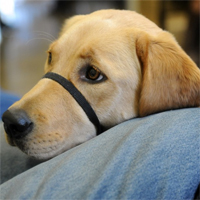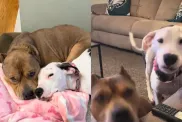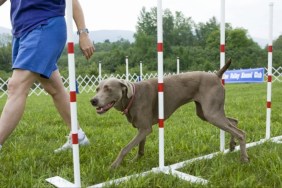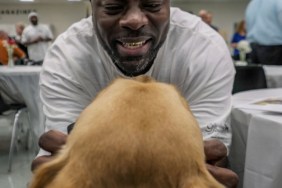A small group of inmates at the Maryland Correctional Institution in Hagerstown, Md., is making a huge difference thanks to a groundbreaking program — and some special four-legged friends.
The medium-security prison, which houses inmates who have been convicted of some pretty serious crimes, partnered with America’s VetDogs — an organization that provides service dogs to United States military veterans — to institute a therapy dog training program for qualified inmates.
The inmates are essentially responsible for raising the future therapy dogs as puppies, providing 24-hour care for the dogs, who sleep alongside the inmates in their cells. They also lead the dogs through an intensive therapy dog training program, teaching them to perform essential tasks like flip light switches and retrieve items. By the end of the year, the inmates-turned-trainers will have taught their puppy partners a total of 30 key commands.
“For us who have done something wrong, it’s a little bit we can do to try to do something right,” inmate and dog trainer Ken Brewer tells CBS Baltimore. Brewer has lived at the Maryland institution for nearly two decades after being convicted of murder.
Brewer, a U.S. Coast Guard veteran, is one of several incarcerated veterans who are taking part in this life-changing program. He says he is honored to be able to do his part, and help other military veterans.
“It’s payback to the people who have helped us so much,” Brewer adds, “the disabled veterans.”
Brewer has played an instrumental role in the early training of Labrador Retriever and soon-to-be therapy dog Trooper. Trooper was one of three dogs who recently graduated from the prison training program. He will now move on to the next phase of the training regiment, which means after their year together, Brewer was faced with the heart-wrenching task of saying goodbye to his buddy Trooper.
“Before his arrival I spent the past 18 years in a kind of self-imposed isolation,” Brewer read in a poignant speech at Trooper’s graduation ceremony at the prison. “Before I was alone, now I have a best friend — a kindred spirit…who truly needs me.”
Though parting with Trooper will be extremely hard, Brewer knows the dog he raised for the past 12 months is moving on to bigger and better things.
“He’s going to make an excellent dog for some veteran,” Brewer says of Trooper. “He’s a top dog.”
While parting is such sweet sorrow, inmates are jumping at the chance to be a part of the training program. Behavior at the prison has largely improved. One of the inmates even renounced his gang hoping that soon he will be on the short list to care for one of the VetDog puppies — and possibly change their own lives for the better as well, as one inmate tells the Baltimore Sun.
“This is an opportunity for you to step up to the plate and do something unselfish for somebody else,” explains Terry Dorsey, another Hagerstown inmate, therapy dog caretaker, and incarcerated U.S. Army veteran.
Dorsey says he is also reaping the benefits of this innovative program, a program that has completely changed the inmate’s outlook on life. Nearly halfway through his 25-year sentence for drug distribution, Dorsey says he spent most of his time behind prison walls feeling isolated and painfully alone. When he met Delta — the Labrador Retriever who’d be sharing his cell for at least a year — Dorsey says he found hope and a new purpose. Dorsey, who has five daughters of his own, truly feels like Delta’s proud papa, too.
“I got another girl here,” he says.
When Delta first arrived at the Hagerstown prison, Dorsey says the pup was frightened. Even though other prisoners made fun of him afterwards, Dorsey would crawl into Delta’s cage at night to try and comfort the crying pup.
“I used to be teased,” he says. “But it was something I had to do.”
“To be incarcerated and have a dog, man, this is like no matter how bad my day is, that dog is always wagging its tail,” he says of Delta.
After watching Brewer say goodbye to Trooper, Dorsey is starting to realize just how hard it is going to be once it comes time for Delta to graduate on to the next phase of the program.
“It’s like losing a friend,” he explains. “And I don’t know. It’s going to be very, very difficult.”
Sources: Baltimore Sun, CBS Baltimore









